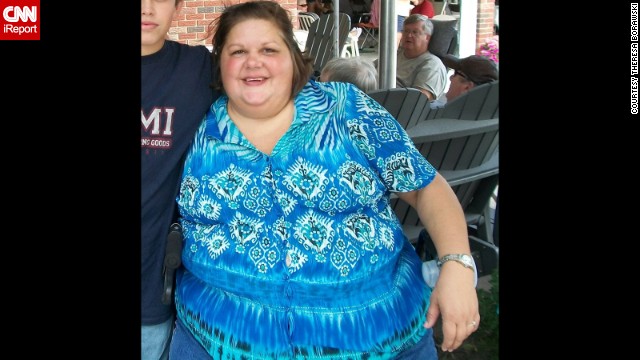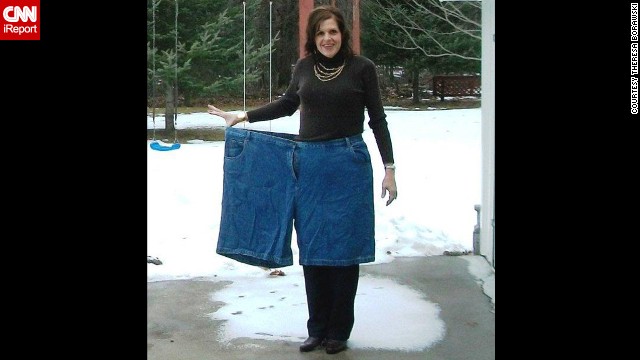(CNN) -- Theresa Borawski sat down heavily on a neighbor's
porch, somewhere in between her front door and her good friend's driveway. The
distance between the two was less than half a mile. It might as well have been
20.
She had already taken a break on a tree stump near the road.
This was the last stop, she told herself as she stood up from the porch slowly.
She was going to make it.
Reaching her friend's house was like reaching the finish
line of a much longer race.
"I was just like I had run in a marathon,"
Borawski remembers. "It was the biggest moment in my life."
"He had to bring me home because I couldn't walk
back," she laughs, "but ..."
But the victory was sweet for a woman who just six months
before had primarily relied on a wheelchair to get around, a woman who had
lived in her house for two years without walking to the mailbox.
At her heaviest in March 2011, Borawski weighed 428 pounds.
"I could no longer participate in life's activities and
was forced to become a spectator while people around me lived their life,"
she wrote on iReport.com. "Today, I am 276 pounds lighter, 14 jean sizes
smaller, and no longer need a wheelchair, walker or cane to get around. I am a
walking, talking miracle and have been given a second chance at life."
Borawski's father died when she was 8. Friends and family
showed their sympathy with food. The lunch lady at school put extra fries on
her tray; the neighbors gave her more candy at Halloween. Her grandparents were
caterers, and their extended family got together often for exorbitant meals.
"I learned at a very young age that food makes the
happy times better and the sad times more bearable," she says.
She was heavy throughout high school and college but says
her weight never really affected her life until 2003, when a series of setbacks
sent her into a downward spiral.
Borawski lost her church job of 15 years and moved more than
200 miles to start anew. She lost her grandfather and best friend back-to-back
a few months later. Then her new job was cut from the church's budget.
"All of a sudden I'm 42 years old, living alone,
unemployed, no income whatsoever," she says.
So she comforted herself with food and decided to go back to
college.
Professor Chuck Bowden wasn't surprised by Borawski's
amazing transformation. She caught his attention right away as a student
willing to work hard.
"I already knew she was dedicated," Bowden says.
"I think starting over as a college freshman had to be a challenge --
almost just as impressive."
Over the next four years, Borawski gained weight steadily.
Her doctor diagnosed her with rheumatoid arthritis, an extremely painful
chronic disease that inflamed her joints. The extra pounds she was carrying
only made the condition worse.
She used a walker or cane to get around. When she graduated
from Mid Michigan Community College, she could barely walk across the stage to
get her diploma.
By January 2011, "my life was in complete chaos,"
Borawski says. She was working at the college and traveled around campus in an
electric wheelchair.
"I always heard her whirring down the hall,"
Bowden remembers. He and Borawski had become friends and chatted often about
the future. "With the (arthritis) and the extra weight, I got very
concerned that she might ... not be able to take care of herself."
His fears weren't far off.
Borawski had difficulty standing long enough in the shower
to wash and condition her hair. She could only shop at stores that had mobile
carts; it took her a week to carry in her groceries from the car because she
could only carry one or two bags at a time. She was seriously considering
moving into an assisted living facility.
"I could barely function," Borawski says. She got
up, rode around in her wheelchair, popped painkillers, ate and went to bed
every night at 7 p.m. "Every bit of energy I had went to just
living."
Her wake-up call came on March 1, 2011. Her sister phoned to
tell her she was getting bariatric surgery. Borawski pleaded with her not to --
she had heard horror stories about the procedure's aftereffects. When the
sister hung up, Borawski went to the refrigerator and took out a bottle of
peach soda.
"Something just clicked in my head," she says. A
quick calculation made Borawski realize she had been drinking nearly 7,000
calories a week in soda -- the equivalent of 2 pounds.
She opened up the bottle and dumped it down the drain. Then
she did the same with the rest of her stash.
At that moment, Borawski gave up sugar cold turkey.
Ten days later, she went to the doctor and had lost 7
pounds. She bought a calorie-counting book on the way home and started reading
food labels. Soon after, she restricted her calorie intake to 1,000 calories a
day (experts warn against eating less than 1,200 calories a day because it
sends your body into starvation mode). She says she wasn't hungry at that limit
because of her lack of mobility.
"Because I was so heavy, I had a lot of success really
quickly. I lost 45 pounds between March and Memorial Day."
In October 2011, Borawski walked to her mailbox without a
cane for the first time. Her next trip was to the neighbor's mailbox. The first
time she walked down the steps at work, her student assistant cheered.
Almost a year later, she showed up in Bowden's office
doorway. He never heard her coming.
"There's a chance we may have done a little dance in
the hall," he says with a laugh. "To see somebody walk again? I
considered that miraculous."
Every time she lost 20 pounds, Borawski went to the store
and bought a pair of pants in the next size smaller. They sat in the corner of
her room until she could pull them on. They were her motivation when she was tempted
to cheat.
To celebrate losing 200 pounds, she bought a black and white
diamond ring. She wears it every day as a reminder never to go back.
"The first row of black diamonds is the first 100
pounds, the second row is the second 100 pounds," she says. "The
white diamonds in between are the new life I've found."
Last month, Borawski walked three miles for the first time.
She does 200 to 300 squats a day to strengthen her legs after years of
immobility. She eats around 1,400 calories to maintain her weight at a healthy
150 pounds. Her rheumatoid arthritis has improved significantly, and her
doctors are "amazed and impressed" at her overall health.
Borawski's goals now are simple: to walk a 5K in September
and to inspire others.
She keeps her electric wheelchair in her office with a sign:
"Theresa doesn't live here anymore."
"The key for me was finding a plan that I could live
with for the rest of my life," she wrote on iReport. "I am a brand
new person, have so much energy and am now a participant in life, rather than
just watching it pass me by. I am blessed beyond measure and can't wait to see
what the future holds for me!"



No comments:
Post a Comment